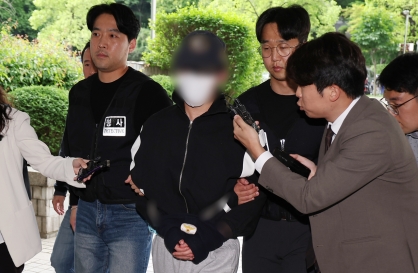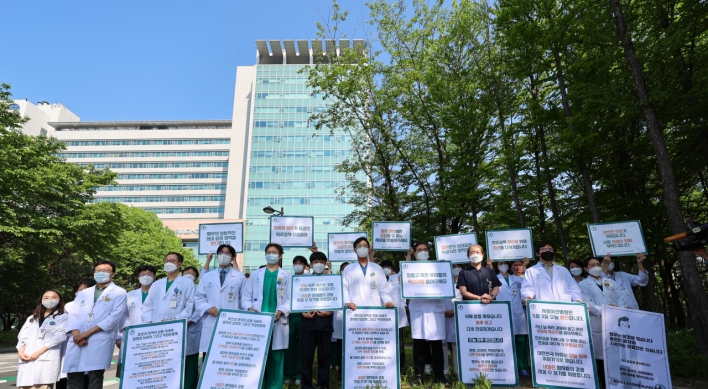Four high-ranking members of Greenpeace stood stranded in front of the immigration office at Incheon International Airport last month.
Three of them ― its Korean manager and East Asia leaders ― were denied entry and ordered to return to Hong Kong. Only Greenpeace International executive director Kumi Naidoo was admitted to the country.
They were not told why they were banned. They guessed the reason may be the group’s anti-nuclear campaign, running counter the Korean government’s plan to expand atomic power generation.
“But Greenpeace has not conducted a single activity yet except for a campaign (against nuclear power). Korea is the only country that has banned Greenpeacers though no activity has been launched,” Rashid Kang, manager for Greenpeace Seoul, said.
He was waiting a plane bound for Hong Kong along with East Asia executive director Mario Damato and regional development director for East Asia Fung Ka Keung.
The Greenpeace activists were among a growing number of people protesting Korea’s immigration policies. They claim the regulations are ambiguous and excessive, and kept secret even from the persons, leaving them puzzled and frustrated.
Korea’s Immigration Control Act denies entry to those who have a contagious disease, have mental illness that is hard to treat and travel without a guardian, have certain types of criminal record and carry illegal drugs, firearms or explosives.
Those banned also include any “person deemed highly likely to commit any act detrimental to the interests of the Republic of Korea or public safety; and a person whose entry into the Republic of Korea is deemed inappropriate by the Minister of Justice.”
Based on the rule, the Ministry of Justice has denied a total of 8,203 people entry to Korea from October to April 2. The lion’s share of cases involved false-name passports, uncertain purpose of stay or those without places to stay.
What observers find problematic are the 463 people who were denied for reasons unknown. They claim that the authorities are abusing the law to screen out civic or labor activists from holding campaigns against the government.
The administration earlier this year deported internationally renowned peace activists Angie Zelter and Benjamin Monnet from Jeju. It also denied the entrance of Elliott Adams, former president of the U.S. Veterans for Peace, and Tarak Kauff, a board member of the VFP. The four of them were staying or aiming to stay at Gangjeong village to protest the administration’s plan to establish a naval base.
In 2011, the authorities banned entrance of Japanese civic activist, Matsumoto Hajime, who was invited by the Seoul Metropolitan Government. Hajime shot to the fame for starting several nonviolent protests against the government. But since he was invited by a city government, many called the decision bizarre.
“We have asked the ministry to figure out why Hajime could not get into the event but we were told nothing,” said a member of Haja center, a youth job training facility operated by Seoul City.
“We are concerned that there is no clear guideline to the regulation. Simply opposing government policies does not constitute denial or prohibition,” an official of the Center for Freedom of Information and Transparent Society said.
None were clearly informed of the reason why they were denied entry into Korea.
“The immigration officer was quite decorous but stern. He repeated that we are among the list of people banned from entering Korea. But he said he could not tell us why we are enlisted, which deprived us of opportunity to study its advisability,” Kang of Greenpeace said.
Since then, Greenpeace Seoul and its headquarters in Amsterdam have been trying to converse with the Korean authorities through various channels but have been denied
“One of the officials said the Korean government decided to not respond to any of our words. It seems that Korea is not so much of an open society after all,” he added.
“The government has been excessively adapting the law to root out labor activists who tried to form a migrant union here and call for foreign workers’ rights,” said Uday Rai, leader of the Migrants’ Trade Union.
“The authorities wouldn’t tell or reconsider the decision which means that unless something dramatic takes place they will not be able to visit Korea again,” he added.
The Ministry of Justice admitted that the rules can be ambiguous.
“We cannot specify all the details about who cannot come and who can. We are capable of discerning detrimental figures,” a ministry official said.
“We don’t need to disclose our criteria either, even to the person him or herself. There is no rule forcing us to. We are abiding by the rules. Besides, they all know why Korea does not want them anyway.”
By Bae Ji-soo (baejisook@heraldcorp.com)
Three of them ― its Korean manager and East Asia leaders ― were denied entry and ordered to return to Hong Kong. Only Greenpeace International executive director Kumi Naidoo was admitted to the country.
They were not told why they were banned. They guessed the reason may be the group’s anti-nuclear campaign, running counter the Korean government’s plan to expand atomic power generation.
“But Greenpeace has not conducted a single activity yet except for a campaign (against nuclear power). Korea is the only country that has banned Greenpeacers though no activity has been launched,” Rashid Kang, manager for Greenpeace Seoul, said.
He was waiting a plane bound for Hong Kong along with East Asia executive director Mario Damato and regional development director for East Asia Fung Ka Keung.
The Greenpeace activists were among a growing number of people protesting Korea’s immigration policies. They claim the regulations are ambiguous and excessive, and kept secret even from the persons, leaving them puzzled and frustrated.
Korea’s Immigration Control Act denies entry to those who have a contagious disease, have mental illness that is hard to treat and travel without a guardian, have certain types of criminal record and carry illegal drugs, firearms or explosives.
Those banned also include any “person deemed highly likely to commit any act detrimental to the interests of the Republic of Korea or public safety; and a person whose entry into the Republic of Korea is deemed inappropriate by the Minister of Justice.”
Based on the rule, the Ministry of Justice has denied a total of 8,203 people entry to Korea from October to April 2. The lion’s share of cases involved false-name passports, uncertain purpose of stay or those without places to stay.
What observers find problematic are the 463 people who were denied for reasons unknown. They claim that the authorities are abusing the law to screen out civic or labor activists from holding campaigns against the government.
The administration earlier this year deported internationally renowned peace activists Angie Zelter and Benjamin Monnet from Jeju. It also denied the entrance of Elliott Adams, former president of the U.S. Veterans for Peace, and Tarak Kauff, a board member of the VFP. The four of them were staying or aiming to stay at Gangjeong village to protest the administration’s plan to establish a naval base.
In 2011, the authorities banned entrance of Japanese civic activist, Matsumoto Hajime, who was invited by the Seoul Metropolitan Government. Hajime shot to the fame for starting several nonviolent protests against the government. But since he was invited by a city government, many called the decision bizarre.
“We have asked the ministry to figure out why Hajime could not get into the event but we were told nothing,” said a member of Haja center, a youth job training facility operated by Seoul City.
“We are concerned that there is no clear guideline to the regulation. Simply opposing government policies does not constitute denial or prohibition,” an official of the Center for Freedom of Information and Transparent Society said.
None were clearly informed of the reason why they were denied entry into Korea.
“The immigration officer was quite decorous but stern. He repeated that we are among the list of people banned from entering Korea. But he said he could not tell us why we are enlisted, which deprived us of opportunity to study its advisability,” Kang of Greenpeace said.
Since then, Greenpeace Seoul and its headquarters in Amsterdam have been trying to converse with the Korean authorities through various channels but have been denied
“One of the officials said the Korean government decided to not respond to any of our words. It seems that Korea is not so much of an open society after all,” he added.
“The government has been excessively adapting the law to root out labor activists who tried to form a migrant union here and call for foreign workers’ rights,” said Uday Rai, leader of the Migrants’ Trade Union.
“The authorities wouldn’t tell or reconsider the decision which means that unless something dramatic takes place they will not be able to visit Korea again,” he added.
The Ministry of Justice admitted that the rules can be ambiguous.
“We cannot specify all the details about who cannot come and who can. We are capable of discerning detrimental figures,” a ministry official said.
“We don’t need to disclose our criteria either, even to the person him or herself. There is no rule forcing us to. We are abiding by the rules. Besides, they all know why Korea does not want them anyway.”
By Bae Ji-soo (baejisook@heraldcorp.com)
-
Articles by Korea Herald










![[K-pop’s dilemma] Time, profit pressures work against originality](http://res.heraldm.com/phpwas/restmb_idxmake.php?idx=644&simg=/content/image/2024/05/08/20240508050705_0.jpg&u=20240508171126)








